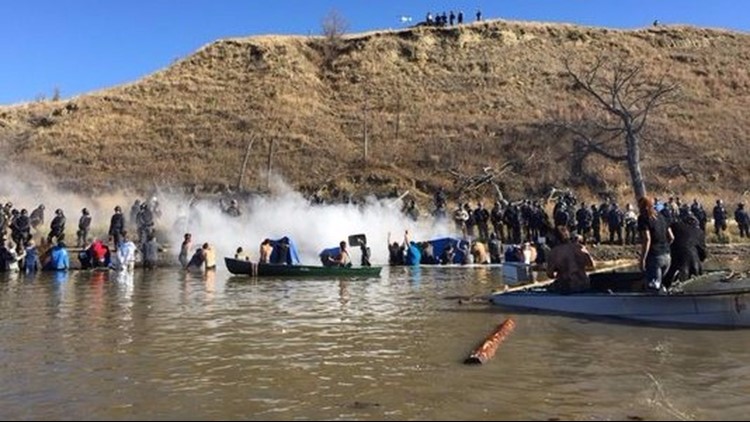Thousands of U.S. veterans will descend this weekend on the site in North Dakota where Native Americans have been protesting the construction of a pipeline that would threaten water and their land.
Among them will be Native Marine veteran John Nelson who will travel from Oregon.
"It's not really a Native thing anymore," Nelson told KGW, KSDK's sister station in Portland. "It's a whole country thing.It's a pure thing. It's a live thing. It's preservation of our country and land."
The People of Standing Rock: Portraits from the pipeline protests
Some 2,000 veterans will join demonstrations against the Dakota Access Pipeline with the idea of giving a break to protesters who have engaged in the standoff for months. The veterans also want to call attention to the violent treatment that law enforcement has waged on the protesters, according to Veterans Stand for Standing Rock.
"We want to offer them a moment of peace and, if we can, take a little bit of pressure off," said Ashleigh Jennifer Parker, a Coast Guard veteran and spokeswoman for Veterans Stand for Standing Rock.
Two-thousand veterans have signed up and the Oceti Sakowin protesters' campsite cannot hold more veterans than that, but about 1,000 more have said they plan to come, Parker said. The veterans plan to set up on Dec. 4 and will stay at least through Dec. 7, she said. She later added that some would remain indefinitely at Standing Rock.
"The militarized police paid for by tax dollars ... is unconstitutional," Parker said.
"People are being brutalized; concussion grenades are being thrown into crowds," Parker said. "They're spraying people, even old women, and other elders of the tribe with tear gas and pepper spray and all of this is just unconstitutional. I can't believe the media hasn't taken more of an interest in this."
Protesters say the $3.8 billion, 1,172-mile pipeline that would stretch underneath a lake on the Standing Rock Sioux Reservation -would threaten water resources and sacred Native American sites. The pipeline is owned by Energy Transfer Partners LP, out of Texas, and is mostly constructed except for the stretch planned to go under Lake Oahe.
North Dakota Gov. Jack Dalrymple has said it is most likely too late to reroute the project, but he would like to restore a relationship with the Standing Rock Sioux Tribal Council. On Nov. 10, Dalrymple called on the White House to end the standoff.
"A federal decision on the project’s easement is long overdue,” Dalrymple said in a statement. “Further delays simply prolong the risks to public safety, prolong the hardships endured by area residents and increase costs incurred by the state of North Dakota and Morton County.”
On Monday, North Dakota state officials ordered the camp vacated, saying the cold makes it dangerous for protesters to stay there. But law enforcement has continued to allow vehicles to enter the site.
The veterans say their action will not be violent and they will have no weapons.
"We will be unarmed, completely prepared for peaceful protest," Parker said. "We don't even like the word 'protest.' We're there to help the water protectors," she said, referring to the phrase that has come to describe the protesters.
The veterans' action came about after veteran Michael Wood, a former police officer, and Wesley Clark, a veteran and screenwriter, set up a crowdfunding campaign on GoFundMe.com to raise money to help veterans support the Standing Rock protests. As of Friday morning, the campaign had raised $850,000.
The organizers said they believe that if they are treated violently, it will draw more attention to the clashes that have been happening at the protest site.
"We’re hoping if we stand together in formation and look the aggressors in their face ... if they can treat us the same way (as they have the protesters) then that should showcase to the American people what's going on up there," Parker said.



